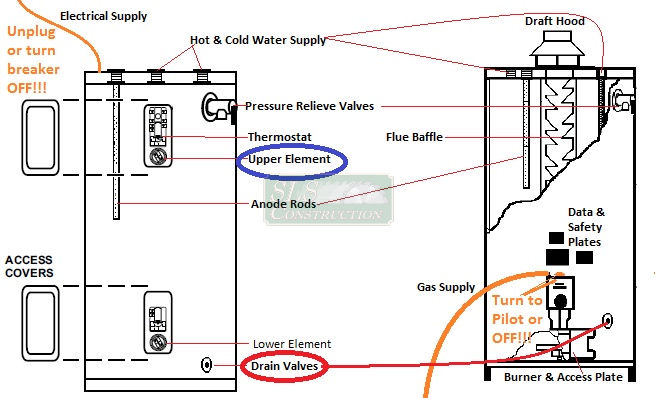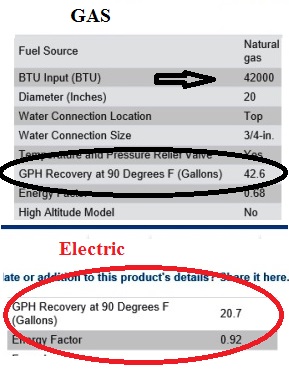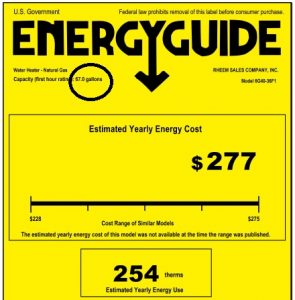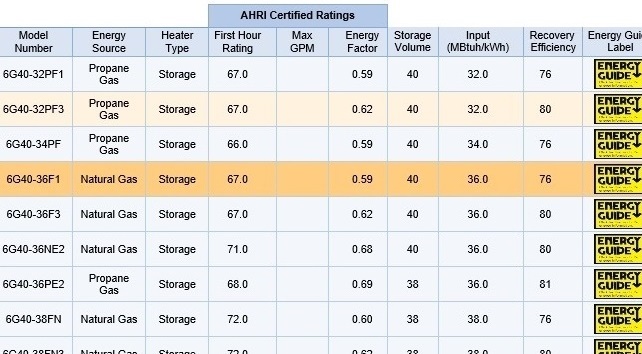 I just drained my tank, how long will it take to heat up? How much hot water can I expect with my shower running? Will I have enough hot water with three teenage girls… These are just a few questions that revolve around just how well a water heater will actually perform based on your needs. In order to figure that out lets look at some common terms and just what they mean in English.
I just drained my tank, how long will it take to heat up? How much hot water can I expect with my shower running? Will I have enough hot water with three teenage girls… These are just a few questions that revolve around just how well a water heater will actually perform based on your needs. In order to figure that out lets look at some common terms and just what they mean in English.
Standby Losses:
A standby loss is essentially how much heat must be used to maintain the water temperature in the tank when there is no call for it. Gas units take a big hit on this as one can generally only insulate the top & sides of the unit as the burner is underneath. They also take a hit (especially older natural drafting units) as they send a lot of heat up through the flu. Electrical units on the other hand have the elements directly in the water allowing for more heat to be delivered to the water itself.
Energy Factor:
Many people might consider this to be the holy grail of numbers, while in fact it can easily deceive you about how well a water heater will perform based on how you will use it. Quite simply it is a standardized protocol to determine how much of the energy delivered to the unit will be used to deliver heated water while accounting for standby losses.
The big catch is when you start factoring in the cost of the “energy” being used, the amount of heat being delivered to the unit (i.e. 2 – 4500 watt elements deliver less heat than a 36,000 BTU unit), how much / when you need hot water, or how the system might actually get such a high number (heat pump style) well you can start to see how it doesn’t paint the whole picture. In case you are wondering – newer gas water heaters built after April of 2015 must be a minimum of .6 with electric being around a .95. Gas tankless versions are around .8 with the newer electric heat pump versions easily hitting 2.5.)
Recovery Rate:
 The recovery rate is the amount of hot water the water heater is capable of producing in a given period of time. The amount of hot water provided will depend on several things: Wattage of the heating elements / burner size, efficiency, temperature rise required, and the time frame used to measure the recovery rate.
The recovery rate is the amount of hot water the water heater is capable of producing in a given period of time. The amount of hot water provided will depend on several things: Wattage of the heating elements / burner size, efficiency, temperature rise required, and the time frame used to measure the recovery rate.
Recovery Rate is generally specified out as how many gallons will be produced assuming a 100º rise in temperature in an hour. Many places are now using 90º as their baseline as the default of setting the temperature to a 140º is not common anymore.
So if you want to know how long it will take for a water heater to come up to temp after being drained, you could use this generic number or calculate it out. BTU (if watts – Watts x 3.413) times recovery efficiency (see AHRI screen shot below) = pounds of water heated 1 degree. Take this & divide by 8.33 (pounds per gallon of water) & then divide by the temperature rise required.
|
Recovery Rate in Gallons based on BTU (76%) & Temperature Rise
|
||||||
|
BTU
|
40° | 50° | 60° | 70° | 80° | 90° |
|
20,000
|
39.0 | 31.2 | 26.0 | 22.3 | 19.5 | 17.3 |
|
30,000
|
58.5 | 46.8 | 39.0 | 33.4 | 29.3 | 26.0 |
|
32,000
|
62.4 | 49.9 | 41.6 | 35.7 | 31.2 | 27.7 |
|
36,000
|
70.2 | 56.2 | 46.8 | 40.1 | 35.1 | 31.2 |
|
40,000
|
78.0 | 62.4 | 52.0 | 44.6 | 39.0 | 34.7 |
|
50,000
|
97.5 | 78.0 | 65.0 | 55.7 | 48.8 | 43.4 |
|
60,000
|
117.0 | 93.6 | 78.0 | 66.9 | 58.5 | 52.0 |
|
75,000
|
146.3 | 117.0 | 97.5 | 83.6 | 73.2 | 65.0 |
|
Recovery Rate in Gallons – Wattage & Temperature Rise ***
|
||||||
|
Element
|
40° | 50° | 60° | 70° | 80° | 90° |
|
4,500
|
46.1 | 36.9 | 30.7 | 26.3 | 23.0 | 20.5 |
|
6,000
|
61.5 | 49.2 | 41.0 | 35.1 | 30.7 | 27.3 |
|
7,500
|
76.8 | 61.5 | 51.2 | 43.9 | 38.4 | 34.1 |
|
9,000
|
92.2 | 73.8 | 61.5 | 52.7 | 46.1 | 41.0 |
|
12,000
|
122.9 | 98.3 | 81.9 | 70.2 | 61.5 | 54.6 |
|
15,000
|
153.6 | 122.9 | 102.4 | 87.8 | 76.8 | 68.3 |
First Hour Rating:
 In many cases this number is probably the most important number to consider as it tells you how much hot water a water heater can deliver in an hour from a fully heated tank. The higher the number the more it can deliver. Please note – this is based on the water temperature being within 20º of the tanks set point. So if your tank is set to 120, you are looking at temperatures ranging from 100 to 120 per the standard (as soon as it drops below that…).
In many cases this number is probably the most important number to consider as it tells you how much hot water a water heater can deliver in an hour from a fully heated tank. The higher the number the more it can deliver. Please note – this is based on the water temperature being within 20º of the tanks set point. So if your tank is set to 120, you are looking at temperatures ranging from 100 to 120 per the standard (as soon as it drops below that…).
This number can easily be found on the Yellow Energy Sticker required on all new products. This sticker is from a 40 gallon gas heater with a rating of 67 gallons.
Ahh but what happens if you (or someone else) tossed it? Well you can always look it up on the AHRI directory &/or download another one. Below is a screen shot from the AHRI directory, if you look under the word AHRI you can find it’s rating. To download another one all you have to do is click the yellow “Energy Guide” icon on the far right.

To get an approximate first hour rating based on your place, you can determine it using the following rule of thumb formula: Tank Capacity x .70 + Recovery (see Recovery Rating above) = First Hour Rating.
Example: If the water heater is 40 gallons with a 36,000 BTU burner you take; 40 (gallons) x .7 + 49.9 (GPH at 50 degree rise in temp — make sure you figure on winter water temps) = 77.9 gallons first hour rating. So is this enough water for everyone to take a shower in the morning – it depends on not only how long they are but how much hot water you are pulling. You consider using a 1.5 gallon shower head will use 90 gallons an hour, you might squeak by with a house full of people with a small break in between showers. ***While an electric version may look a tad better (assuming 2 4500 elements) most professionals will tell you to base your numbers off of just one element or max 1.3 of the total as the top one will not be in use as much due to the physics of the units.
Curious why multiply by 0.70? As mentioned this is an old rule of thumb trick based on factoring in the cold water entering the tank and diluting /tempering the heated water which is also known as draw efficiency.
Hopefully this has given you an insight into just what these numbers mean – in a later piece we will look into the different unit types available and work out, just what is the best unit or option for me

So I have a weird problem that has happened twice in the last couple days.
I have a 40 gal gas unit 5 or 6 years old and we’ve never run out or low on hot water before till now.
Shower heads are 2.5 gph, we’ve had 2 adults using sperate showers at same time and not experienced running out before.
But now the recovery time to reheat seems to have increased suddenly and dramatically.
Both time this happened 1 adult shower followed by another within 5 minutes and temperature was only in warm to Lukewarm range and barely enough to finish.
No dishwasher or clothes washer are on during these times.
What should I inspect to solve my problem?
When was the last time you drained it? https://thehtrc.com/2010/basic-water-heater-maintenance-draining
Did an element go?
I was thinking an element too, but this only has the one bottom burner a far as know. Can gas units have more than one?
I haven’t ever drained it.
We don’t have any hard water at all here at this house.
I can give it a try.
Nope – only 1. If draining doesn’t work, might have to get a plumber to see if you have an issue with the burner, tubes, or just replace – there are better units available now though they are generally a little larger. Just make sure if the water heater is inside, it is a direct vent unit – the rest don’t belong inside your house